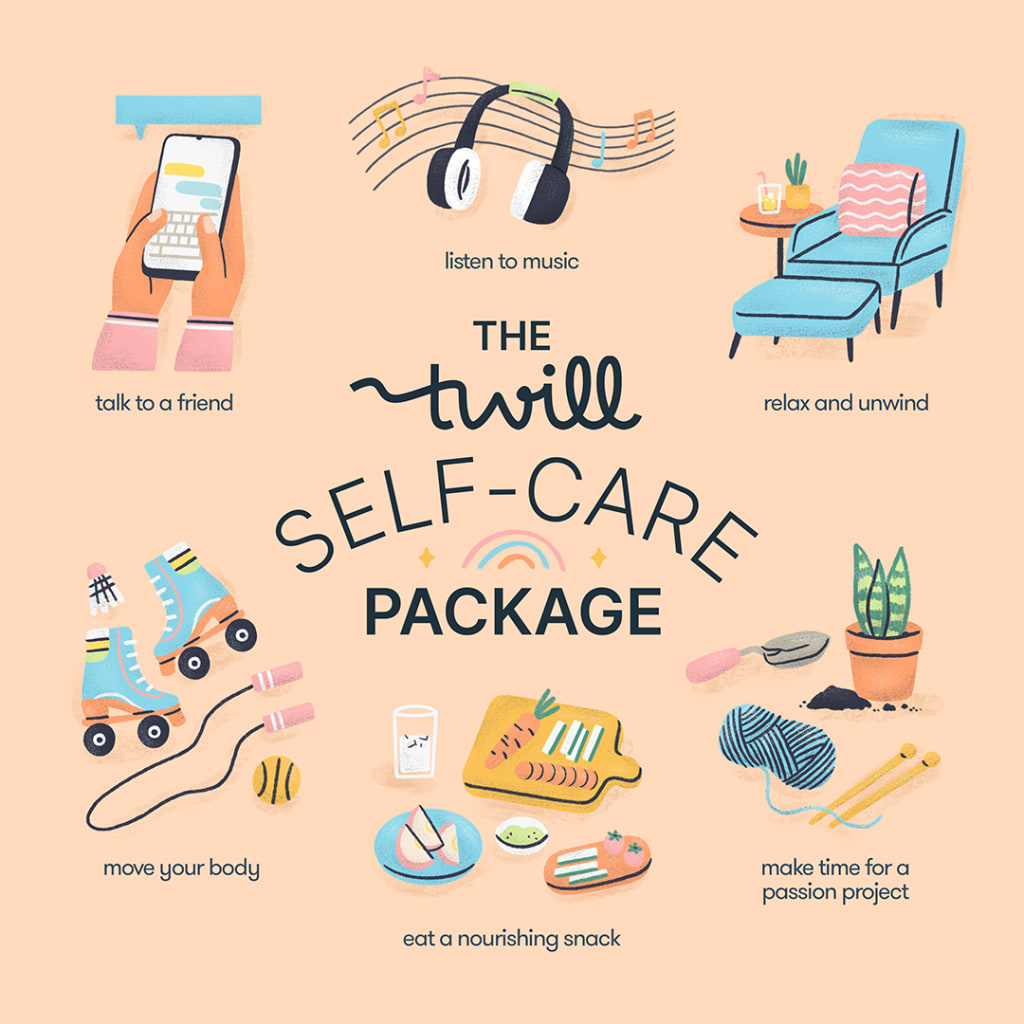SELF-CARE
Self-care refers to intentional actions that individuals take to promote their physical, mental, and emotional well-being. It involves making time for oneself to engage in activities that reduce stress, boost mood, and improve overall health.

Self-care refers to intentional actions that individuals take to promote their physical, mental, and emotional well-being. It involves making time for oneself to engage in activities that reduce stress, boost mood, and improve overall health.
Self-care can take many forms, including:
Physical self-care: This involves activities that promote physical health, such as regular exercise, healthy eating habits, getting enough sleep, and taking care of personal hygiene.
Emotional self-care: This involves taking care of one's emotional well-being, such as engaging in activities that reduce stress, such as meditation, mindfulness, or journaling. It can also involve reaching out to friends or family for emotional support or engaging in activities that bring joy or fulfillment.
Social self-care: This involves engaging in social activities that promote positive relationships with others, such as spending time with loved ones, joining a club or group, or volunteering in the community.
Intellectual self-care: This involves engaging in activities that stimulate the mind, such as reading, learning new skills, or pursuing a hobby.
Spiritual self-care: This involves engaging in activities that promote a sense of purpose, meaning, or connection to something greater than oneself, such as practicing mindfulness, attending religious services, or spending time in nature.
It's important to note that self-care is not selfish or indulgent, but rather an essential aspect of maintaining good physical, mental, and emotional health. Making self-care a priority can help individuals better manage stress, prevent burnout, and promote a greater sense of overall well-being.
Tips for self care
Here are some tips for practicing self-care:
Make time for self-care: Schedule time for self-care activities in your daily or weekly routine. Consider this time as important as any other appointment or commitment.
Get enough sleep: Getting adequate sleep is crucial for physical, mental, and emotional well-being. Aim for 7-8 hours of sleep each night.
Eat a balanced and healthy diet: Eating a balanced and nutritious diet can help you feel more energized and better able to manage stress.
Stay physically active: Regular exercise can help reduce stress, improve mood, and promote overall health.
Practice mindfulness: Mindfulness techniques such as meditation, deep breathing, or yoga can help you relax and reduce stress.
Connect with others: Social connections and relationships are essential for overall well-being. Make time to connect with loved ones, friends, or support groups.
Pursue hobbies or interests: Engaging in activities that bring you joy or fulfillment can help you feel more relaxed and satisfied.
Take breaks and rest: It's important to take breaks and rest when you need it. Don't feel guilty about taking time off to recharge.
Set boundaries: Learn to say no to commitments that you don't have the time or energy for. Setting boundaries can help you protect your time and energy.
Seek professional help when needed: If you're struggling with physical, mental, or emotional health issues, don't hesitate to seek help from a medical or mental health professional. They can provide support and guidance to help you take care of yourself.
How to treat yourself right
Treating yourself right involves taking care of your physical, mental, and emotional needs in a way that promotes overall well-being. Here are some ways to treat yourself right:
Practice self-compassion: Treat yourself with kindness and understanding, and avoid negative self-talk.
Set healthy boundaries: Learn to say no to commitments that you don't have the time or energy for, and prioritize your needs.
Take care of your body: Get enough sleep, eat a balanced and healthy diet, and engage in regular physical activity.
Engage in self-care activities: Set aside time for activities that bring you joy and promote relaxation, such as reading, taking a bath, or listening to music.
Surround yourself with positive influences: Spend time with people who uplift you and avoid relationships that are draining or negative.
Pursue personal growth: Challenge yourself to learn new things, pursue your passions, or set new goals for yourself.
Take breaks and rest: Make time for breaks and rest when you need it, and avoid overworking or overcommitting yourself.
Practice gratitude: Focus on the positive aspects of your life, and express gratitude for the things you have.
Seek support when needed: Don't hesitate to reach out to loved ones, support groups, or mental health professionals when you need help.
Treating yourself right involves prioritizing your needs and taking care of yourself in a way that promotes overall health and well-being. By doing so, you can feel more energized, fulfilled, and satisfied with your life





Comments
There are no comments for this story
Be the first to respond and start the conversation.